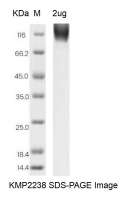Human Siglec-10 Protein, Fc Tag
-
产品编号
KMP2238
-
别名
唾液酸结合免疫球蛋白样凝集素-10, Siglec10, MGC126774
-
规格
- 50ug
- 100ug
- 200ug
| Alias | 唾液酸结合免疫球蛋白样凝集素-10, Siglec10, MGC126774 |
| Catalog Number | KMP2238 |
| Product Description | The Human Siglec-10 Protein(KMP2238) is produced in HEK293 Cells and the target gene encoding Met17-Thr546 is expressed with a Fc tag at the C-terminus. |
| Molecular Name | Siglec-10 |
| Species | Human |
| Host | HEK293 Cells |
| Size | 50ug, 100ug, 200ug |
| Purity | >95% as determined by SDS-PAGE |
| Purification | Affinity purification |
| Endotoxin | <1.0 EU/ug determined by the LAL method |
| Formulation | PBS, pH7.4 |
| Background | Siglecs(sialic acid binding Ig-like lectins) are I-type lectins that belong to the immunoglobulin superfamily. They are characterized by an N-terminal Ig-like V-type domain which mediates sialic acid binding, followed by a varying number of Ig-like C2-type domains. Siglecs 5-11 constitute the CD33/Siglec-3 related group, and are differentially expressed in the hematopoietic system. Siglec-G is the apparent ortholog of human Siglec-10. We describe here a novel member of the siglec protein family that shares a similar structure including five Ig-like domains, a transmembrane domain, and a cytoplasmic tail containing two ITIM-signaling motifs. Siglec-10 was identified through database mining of an asthmatic eosinophil EST library. Siglec-10 binds sialated proteins and lipids in alpha 2,3 or alpha 2,6 linkage and shows a preference for GT1b gangliosides. This binding can be modulated by cis interactions of Siglec-10 with sialated molecules expressed on the same cell. When tyrosine phosphorylated, the cytoplasmic ITIMs interact with phosphatases SHP-1 and SHP-2 to propagate inhibitory signals. The Siglec-10-VAP-1 interaction seems to mediate lymphocyte adhesion to endothelium and has the potential to modify the inflammatory microenvironment via the enzymatic end products. |
| SDS-PAGE |  |
| Predicted Molecular Weight | 58.23 kDa |
| Storage Condition | Aliquot and store at -20℃ to -80℃. Avoid repeated freezing and thawing cycles. |
| Shipping Condition | In general, the proteins are provided as lyophilized powder which are shipped at ambient temperature. They are shipped out in dry ice if supplied in liquid form. |
| Uniprot ID | Q96LC7 |
| References | 1.Biochem. J. 355:489-497 (2001) 2.J. Surg. Res. 194:107-113 (2015) 3.Biochem. Biophys. Res. Commun. 296:355-362 (2002) |
| Function | Putative adhesion molecule that mediates sialic-acid dependent binding to cells. Preferentially binds to alpha-2,3- or alpha-2,6-linked sialic acid (By similarity). The sialic acid recognition site may be masked by cis interactions with sialic acids on the same cell surface. In the immune response, seems to act as an inhibitory receptor upon ligand induced tyrosine phosphorylation by recruiting cytoplasmic phosphatase(s) via their SH2 domain(s) that block signal transduction through dephosphorylation of signaling molecules (PubMed:11284738, PubMed:12163025). Involved in negative regulation of B-cell antigen receptor signaling. The inhibition of B cell activation is dependent on PTPN6/SHP-1 (By similarity). In association with CD24 may be involved in the selective suppression of the immune response to danger-associated molecular patterns (DAMPs) such as HMGB1, HSP70 and HSP90 (By similarity). In association with CD24 may regulate the immune repsonse of natural killer (NK) cells (PubMed:25450598). Plays a role in the control of autoimmunity (By similarity). During initiation of adaptive immune responses by CD8-alpha+ dendritic cells inhibits cross-presentation by impairing the formation of MHC class I-peptide complexes. The function seems to implicate recruitment of PTPN6/SHP-1, which dephosphorylates NCF1 of the NADPH oxidase complex consequently promoting phagosomal acidification (By similarity). |





 0
0
